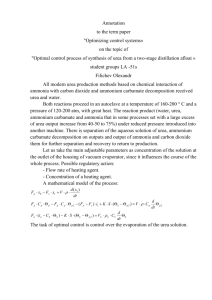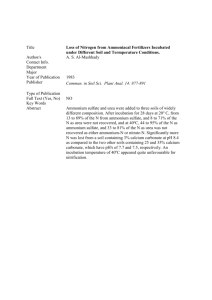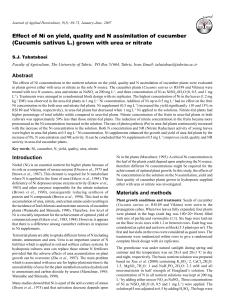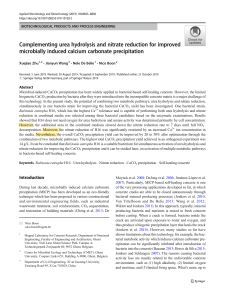Urea Ammonium Nitrate (UAN)
advertisement
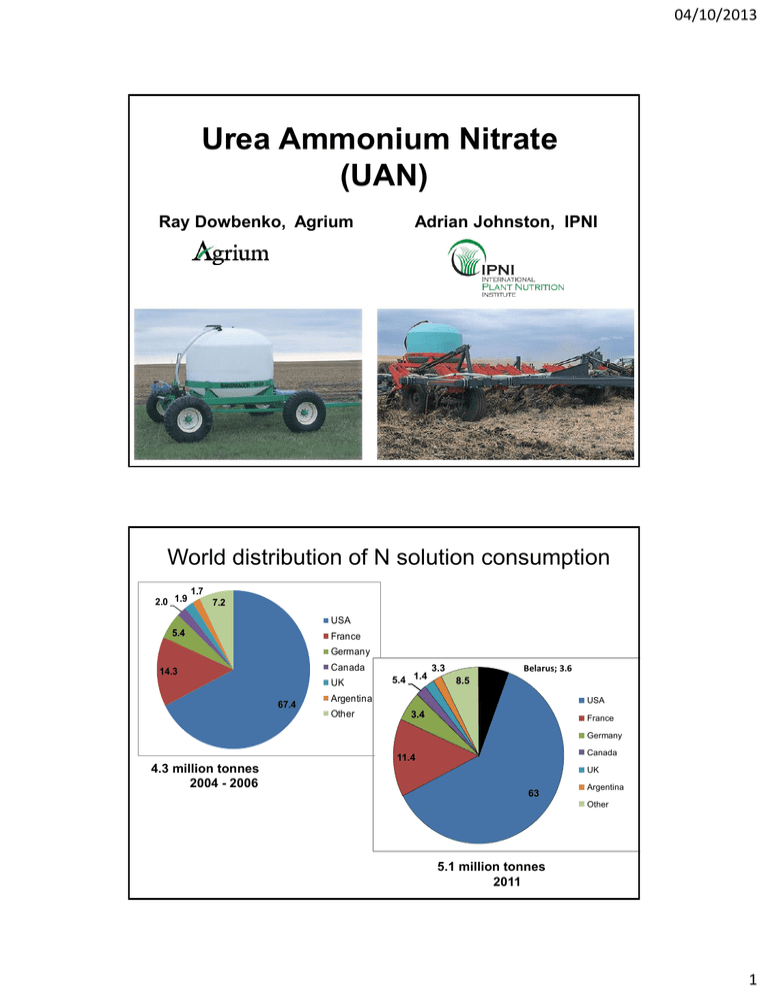
04/10/2013 Urea Ammonium Nitrate (UAN) Ray Dowbenko, Agrium Adrian Johnston, IPNI World distribution of N solution consumption 2.0 1.9 1.7 7.2 USA 5.4 France Germany Canada 14.3 UK 67.4 5.4 1.4 Belarus; 3.6 3.3 8.5 Argentina Other USA 3.4 France Germany Canada 11.4 4.3 million tonnes 2004 - 2006 UK 63 Argentina Other 5.1 million tonnes 2011 1 04/10/2013 Urea-Ammonium Nitrate Solutions 1. 28 % nitrogen (also 32-0-0) 2. Liquid 3. N forms: urea (14%) and ammonium (7%) and nitrate (7%) 3 28-0-0 & 32-0-0 • 32-0-0 used in warmer climates (salt out @ 0C) • 28% nitrogen solution (salt out @ -18C) – 50% Urea – 25% Ammonium – 25% Nitrate • Only N fertilizer to contain these three forms of nitrogen in one product. 2 04/10/2013 Urea-Ammonium Nitrate Solutions Manufacture 1. Ammonia + urea + ammonium nitrate + water + nitric acid 2. Urea + ammonium nitrate + water Most common process, can use liquid or solid forms of urea and ammonium nitrate 3. Urea + nitric acid + ammonia 28-0-0 • • • • • 0.36 kg of Nitrogen per litre 1.2 kg/ per litre of 28-0-0 781.3 litre per tonne Salt-out temperature of -18° C Specific gravity is 1.275 @ 15.5° C 3 04/10/2013 Liquid Fertilizers • Liquid fertilizers are completely blend compatible • Each droplet is a homogeneous mix of nutrient • Even application • Excellent carrier for micronutrients • Liquid fertilizers contain the same nutrients that are found in other fertilizers Placement Options • • • • • Banded in soil Banded on the surface Sprayed on soil surface Split applications for foliar topdress Fertigation or injection into irrigation systems • Potential to mix with herbicide and foliar apply 4 04/10/2013 Applying Liquids at Seeding Application Accuracy • Liquid application technology is simple, accurate, easily metered, and monitored • Suitable for “low labour” operations • Fit with drip irrigation/fertigation 5 04/10/2013 Ease of Handling • Liquids are stored and pumped in non-pressurized containers • Poor weather, i.e.. rain, does not cause problems • Ease of transfer – one person operation is feasible – flexible hose, no accurate backing up of the nurse tank or truck 6 04/10/2013 Machinery Developed for Large Farms • Large capacity wagons allow more acres per fill • Prescription blends for each field are easily achieved 7 04/10/2013 Applying Liquids Pre- or Post-Emergence Surface dribble band In soil coulter application Reasons for Interests ► Reduce volume of material handled during the seeding operation to accelerate seeding ► Protect protein concentration in grain ► Better ability to manage risk associated with N applications under dry soil conditions 8 04/10/2013 Nitrogen Agronomy • Split Applied UAN Management and/or Environment • Reduced moisture at seeding • Post-seeding “high” rainfall yield and/or protein • Higher cost involved…Risk management On-farm and in field storage units 9 04/10/2013 Safe Handling • Not stored under pressure • No dust created while handling • Closed storage and distribution, so minimal operator exposure • Most forms are low in corositivity and low toxicity • Can be easily washed off with water if contact with skin occurs Disadvantages • Lower nutrient analysis... higher cost per lb of nutrient • Storage space...large volumes • Hard to pick-up a spill • Freezing/salting out (cold temperatures) • Require containment system (in case of storage tank failure) 10 04/10/2013 Liquid and Dry or Ammonia Fertilizers • Many of the liquid advantages are dry advantages as well • Many of the options with liquids, are options with dry fertilizer and ammonia as well • Do not “stretch” the science • Choose what you are comfortable with, and what fits into your operation Liquid and Dry or Ammonia Fertilizers • Agronomically – the same • Under proper agronomic consideration, all forms pretty much the same • Plants cannot tell the difference in nutrients • Controlled research shows little to no difference between fertilizer sources 11 04/10/2013 Urea Ammonium Nitrate (UAN) Ray Dowbenko, Agrium Adrian Johnston, IPNI 12
